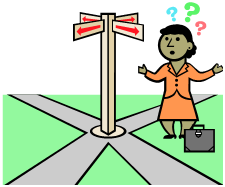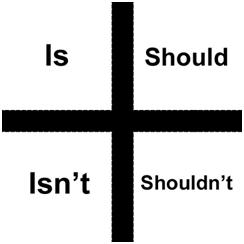I Don’t Know
 There is power in the words “I don’t know.” It’s the power of discovery.
There is power in the words “I don’t know.” It’s the power of discovery.
The words of the ancient Chinese sage, Lao Tzu came to mind as I wrote the title of this blog,
“He who knows, does not speak. He who speaks, does not know.“
True knowing comes from a quiet place, not a noisy mind.
A chattering mind is the epitome of a “know it all.” We have learned to associate who we are to the voice in our head. That’s who we call “I.” It’s the “eye” of our mental storms. This “I” is quite capable of stirring up all sorts of activity, but not true knowing. If this part of us was being described on an inner city street corner, you would hear the true meaning of the phrase, “I don’t know.”
I remember my New Year’s Resolution of a few years ago, “To know less and discover more.” That reminder came back the other day in the form of a prayer.
Everyone has something going on in their life that they have no clue as to how to solve. Most of us go into the thinking mode to solve it. That just keeps the situation at the top of our mind and a resolution at arm’s length. If you find yourself in this situation, here’s a suggestion: Surrender to the fact that you don’t know. Send the white flag up the pole and put yourself at the mercy of the court. It is one of the most freeing exercises you can do. It frees your mind from the burden of solving your problem and peace of mind is the result.
The prayer “I don’t know” allows you to discover the limitations of the thinking mind. When you surrender yourself to the position of “I don’t know what to do,” the scheming mind becomes quiet for a moment and makes room for something new to enter this space of calm.
It’s hard for some people to surrender. They’ve been conditioned to fight. They are so blinded by their fighting image that they have no clue as to the size of their opponent. They pat themselves on the back for trying, but live their lives broken as a result.
Take a moment today. Get yourself away from the maddening crowd; get as quiet as you can and just utter the words “I don’t know what to do.” Notice what happens. Repeat the phrase a few times to prime the pump of inspiration and see what happens. I believe you’ll be in for a peaceful surprise.
“When you’re tired of knowing, you’ll begin growing.”
All the best,
John
http://cdbaby.com/cd/johnmorgan
http://www.cafepress.com/grasshoppernote/3580301
Be Sociable, Share!


 When I was a kid we used to play 3-on-3 touch football in the street. That meant that if you were playing offense you had one guy hike the ball, one guy be the quarterback, and the other kid to be the receiver. The other 3 guys played defense and tried to not let you advance the ball. In just about every huddle the words “Go deep” were used.
When I was a kid we used to play 3-on-3 touch football in the street. That meant that if you were playing offense you had one guy hike the ball, one guy be the quarterback, and the other kid to be the receiver. The other 3 guys played defense and tried to not let you advance the ball. In just about every huddle the words “Go deep” were used.
 When you have a conversation with someone, you are either sharing reality or sharing philosophy. It’s helpful to know which conversation you’re having.
When you have a conversation with someone, you are either sharing reality or sharing philosophy. It’s helpful to know which conversation you’re having.
 It’s the one we can’t forget about, but also can’t figure out. In police terms it’s called a “
It’s the one we can’t forget about, but also can’t figure out. In police terms it’s called a “ Got a spontaneous visit from
Got a spontaneous visit from  Superiority is a mind myth, an illusion.
Superiority is a mind myth, an illusion. It seems there are only two professions that pay you to knock people out – Anesthesiology and Boxing.
It seems there are only two professions that pay you to knock people out – Anesthesiology and Boxing.
 We make a lot of mistakes in life and some of them hurt more than others. Some are embarrassing and others downright demoralizing.
We make a lot of mistakes in life and some of them hurt more than others. Some are embarrassing and others downright demoralizing.